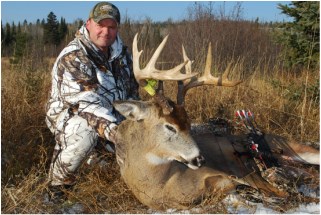THUNDER BAY — John Kaplanis says "it's an honour" to lead a new provincial advisory body that will review moose-hunting quotas and tag allocations.
Kaplanis will serve as chair of the Big Game Management Advisory Committee announced last week by Natural Resources and Forestry Minister John Yakabuski.
The Thunder Bay resident is also the executive-director of the Northwestern Ontario Sportsmen's Alliance, a group that has sharply criticized the MNRF for "inconsistent" and overly cautious moose management and tag allocation processes.
In a media release, Kaplanis said the ministry has used "creative math" to over-estimate the previous year's moose harvest, "thus forcing the moose harvest allocation formula to generate fewer adult tags" for resident hunters in northwestern Ontario.
"Despite a large increase in moose tags for rifle hunters in Wildlife Management Unit 15B [north of Thunder Bay and west of Lake Nipigon] due to a moose population survey that revealed very encouraging numbers...many other WMUs with increasing or stabilizing moose populations are still not being afforded the hunting opportunities that they should be," the statement said.
In an interview Monday, Kaplanis told Tbnewswatch he was approached by Minister Yakabuski directly to lead the new committee.
"The difference between this committee and former ones is that it is responsible to give feedback and recommendations directly to the minister himself. Previously, recommendations went to the wildlife branch within the MNRF. That in itself makes the ministry agencies at the wildlife level more accountable. I think that's a positive thing," he said.
Kaplanis feels he and the other committee members can offer valuable insight that will lead to improvements in moose management.
"We have a lot of experience hunting over the years, and are familiar with the landscape of the north. We have a feel for what we need to do in terms of wildlife management. Certainly I take that very seriously."
Kaplanis described moose hunter satisfaction with the province's current management program as being at an all-time low.
"Number one, they are not satisfied with the number of tags they are getting," he said, adding that management practices also need to be tailored better to the health of the moose herd in specific WMUs.
In units where the population is in decline, "we need to see more intensive management practices. But in areas where the herd is healthy, we'd like the ministry to recognize that more moose hunting opportunities should be afforded there."
Kaplanis pointed to the economic value of hunting, which he said generates "millions of dollars in revenue that, in the end, goes back into moose management and conservation. It's very important to maintain that."
His eight-member committee includes two other Thunder Bay residents, Elford Wiens and Glenn Rivard, as well as Fern Duquette of Atikokan and Bradley Greaves from Ignace.
